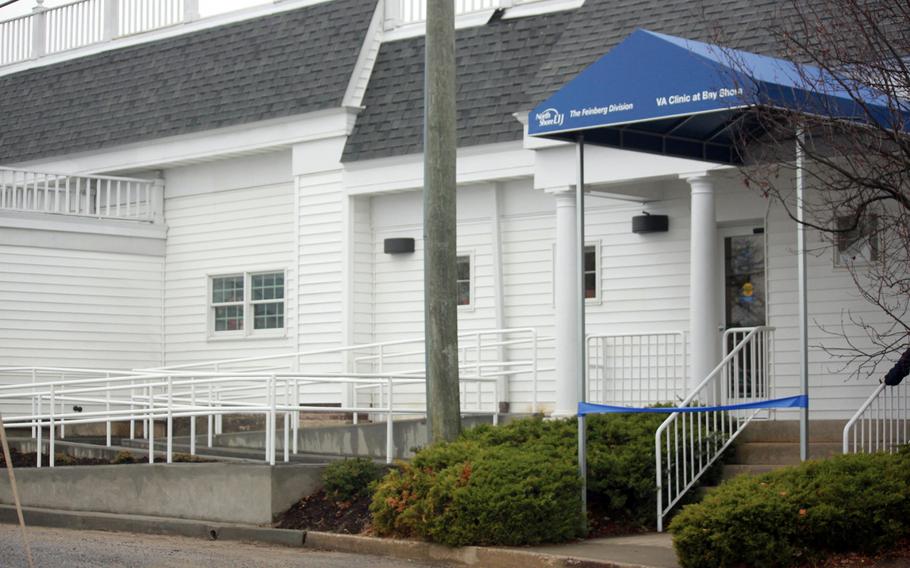
The small center has a waiting room and a few treatment rooms on each side, and a handful of doctors and therapists, such as a psychiatrist and an addition counselor, rotate through during the week to see patients. (Megan McCloskey/Stars and Stripes)
BAY SHORE, NY — At a new VA mental health facility here, veterans go to the right, their families to the left — and their doctors meet in the middle.
The Unified Behavioral Health Center for Military Veterans and Their Families is a first-of-its-kind partnership between the Department of Veterans Affairs and private health care that will treat veterans and their families holistically under one roof.
One side of the small center houses VA psychologists, psychiatrists, social workers and counselors, and the other side has counterparts from North Shore Long Island Jewish Health System, which provides care to veteran families at no cost.
The heart of the novel concept, the clinicians say, is their shared conference room.
With the patient’s consent, the clinicians from both divisions will “come together as a team and talk about the issues,” allowing them to coordinate treatment plans based on what’s happening with the entire family, said Charlene Thomesen, director of the VA side of the center.
“For example, we can better treat the wife because we’re informed of what’s happening to veteran,”said Mayer Bellehsen, a psychologist and Thomesen’s counterpart on the family side of the center.
At the center’s grand opening in December, Robert Petzel, the VA’s under secretary for health, spoke about how the VA wasn’t here “just to treat post-traumatic stress disorder, or depression, or substance abuse. We’re here to treat complex human beings.
“And bringing the families into the treatment equation is something we should have started doing years ago. It’s long overdue.”
This new model of care recognizes that military-related mental health issues affect the entire family, and treatment of the veteran alone often isn’t enough to resolve the issues. So rather than the veteran going to the VA for therapy, the wife going to another clinic and the child to yet another, they have a one-stop shop, which clinicians hope will lead to earlier intervention in problems and help keep marriages and families together.
“It’s like going to a Walmart supercenter and getting everything,” said Mani Krishnamurthi, a VA psychiatrist, also noting that the new building provides the area’s 150,000 veterans with an improved place for care. For decades he saw patients in a VFW hall.
Often a veteran will only get help once his wife gets treated herself, and with the center, the civilian doctors are more linked into the VA. The family getting treatment becomes a gateway to the veteran.
“Maybe he’s not too thrilled, but we get him in the door at least,” said Andy Roberts, an Army veteran and the Iraq and Afghanistan veterans coordinator for North Shore.
The center is defining family broadly, including parents, siblings or any other relative with whom the veteran lives as eligible for treatment.
On the other side of the house, for the VA doctors, the partnership eases getting care for the veteran’s family.
Kathlyn O’Neill, an addiction counselor with the VA, calls the new set up “a dream come true.” She said with the traditional VA system, if she realizes a veteran’s child, for example, is struggling, she spends an inordinate amount of time playing case manager trying to coordinate care, figuring out what is available for the child at the school district or making telephone calls to providers. Now, she can refer them to the other side of the office to trusted doctors who are familiar with veteran family issues.
Ken Storz, a retired Army Reserve colonel from Long Island, said this model of care “lessens the pressure on a returning vet, because his family can get the help that it needs.”
The center is a rare embrace of the private sector for the VA, which is often a lumbering bureaucracy resistant to change and outsiders. Forging the unique public-private partnership took three years.
“You don’t often get the opportunity to do things this creative in government because there’s so much red tape,” Thomesen said.
The center wouldn’t have come together without private donations and funding, including a 3-year, $300,000 grant that required matching funds from the community, and a $1 million donation from locals Frank and Mildred Feinberg.
The center’s staff sees the model as the way of the future, and they are collecting data.
“We think it’s not just the way forward for the VA,” Thomesen said, “but for all mental health services to be provided this way.”
mccloskey.megan@stripes.com Twitter: @megmccloskey